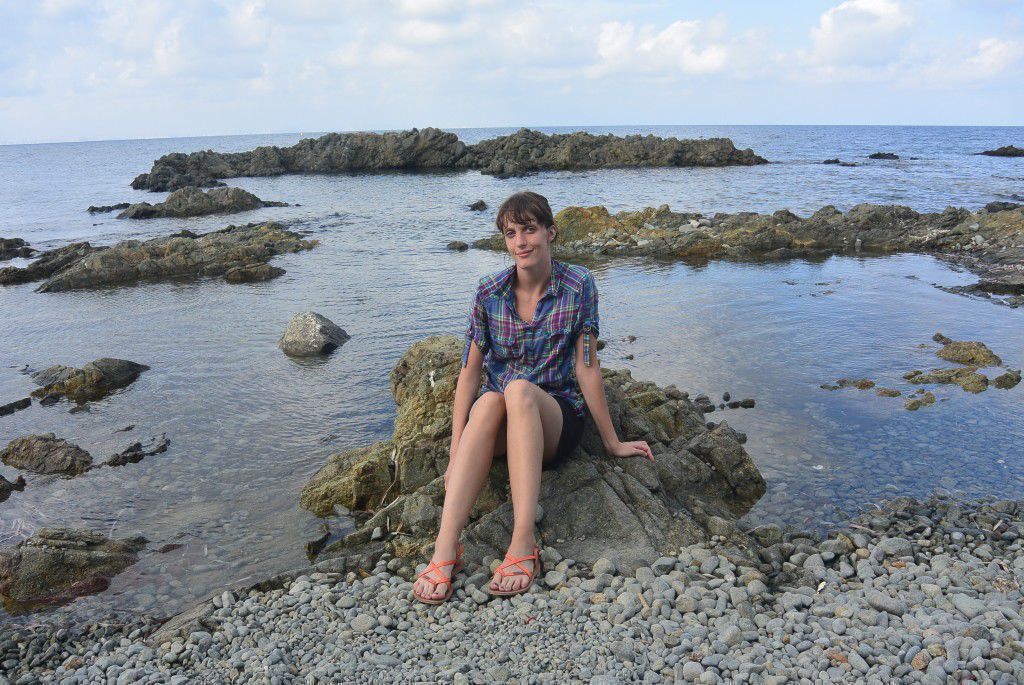A Language Journey
Today we’ve got a fantastic guest post from Kelly Wang – English teacher, accidental traveller, cake whisperer, dinosaur believer – on her personal language learning journey.
If you’ve got a language story to tell, we’d love to hear it! Now over to you, Kelly…
My journey through languages began in sequins and shoulder pads.
At the age of seven I remember clutching a Pot Noodle (Chow Mein flavour, if you must know), with an A4 pad in front of me and one of those 10 coloured pens ready and poised, waiting for the Eurovision Song Contest.
It has long been a tradition in my family to watch the Eurovision together, and to give marks out of ten to the acts. And at that age, I was of the opinion that English was the only language in the world, so my marking scheme would include whether or not the songs were in English. No English? Nil points.
I even took exception to the fact that each country when giving their own points spoke in their own language. How rude.
Fast forward to the last year of primary school and we learnt a few French words like bonjour and le livre and la fenêtre.
I still thought English was the best language.
But then, on reaching secondary school, when we started to learn a ‘modern foreign language’ regularly (in my case, French), I loved it. I loved the idea of being able to speak to everyone, no matter the language. And better than that, I was picking it up pretty easily.
The following year there was a repeat performance with learning German, and I remember a sort of teenage arrogance of thinking that languages were going to be ‘my thing’, because by the time I was sixteen I could also say Θέλω να πάω σπίτι in Greek – Thélo̱ na páo̱ spíti (I want to go home).
Over the years I’ve flirted with a lot of languages. I tried Chinese for a while, but with the complicated tonation, I was more worried about causing offence with the way I said a word, and less worried about actually stringing a sentence together.
And then, I found my true language love. The one language I could lose myself in and spend hours learning just for fun. The one language I would squeal over if I heard it spoken in public. Which is Finnish. Naturally.
Finnish may sound like an odd choice, but it made perfect sense to me. What started with a passing interest listening to Finnish metal music erupted into a bit of an obsession when I found myself frustrated that I couldn’t understand the Finnish ice hockey commentary.
For almost two years, Finnish became my number one hobby. Being relatively self-disciplined when it comes to studies, I decided to learn through a mix of self study and online language exchanges. Many an adventure was had along the way, and that perhaps is a story for another time, but I loved it. No prepositions to learn because everything was a suffix, and by changing the word ending you could say a whole range of things about it: saunassa, saunasta, saunan (in the sauna, from the sauna, for the sauna). No articles, no need to wonder if your table was a girl and your chair was a boy, it didn’t matter. Neither did you have to refer to a person as he or she, one simple han and it was covered! Beautiful.
Fast forward another year, and I found myself attempting to get to grips with Hungarian. Now for those of you who don’t know, Finnish and Hungarian are cousins of the language world, and it depends on which scholar you speak to as to how close a family they are. My experience was that whilst it sounded an awful lot like Finnish, Hungarian was nothing like it at all, except for the odd words like toilet: Hungarian – vécé, Finnish vessa.
And currently, I find myself in Spain. Adamantly not learning the language.
Because the problem now, with being a ‘jack of all trades, master of none’ when it comes to language, is that they all get tangled up. A waiter asks me if I want a refill, I answer in a mix of Spanish and Hungarian. I overhear staff in my local Chinese supermarket and confuse them – and myself – by responding in Chinese rather than Spanish. And recently on a stopover in Paris, I managed to respond to questions in French but found myself asking questions in Finnish.
What I really could do with is a babel fish. Or to live in the TARDIS. Unfortunately, I am in the wrong reality for that. But. I still love languages.
So. I don’t know what the foreign language for me is going to be. Should I return to French, attempt to master Finnish, or take up something new like Dothraki? Or will that lead to more unnecessary tongue twisting? I just don’t know. Would you like to join me on my journey?
Kelly
So you want to learn Spanish?
Starting to learn Spanish has been an amazing journey. So far, the language and the people are really interesting, and it’s nice to know that a large population of Americans can speak the language. After long hours of practice, I am sitting here writing a post, while listening to my favorite Spanish rap songs.
Spanish class helped me in some ways and has hurt my interest in others. This was due to the grammar, and also we weren’t actually speaking. As much as I love doing grammar workbooks and vocabulary quizzes, I was more interested in sounding like Don Juan seducing girls.
 Spanish is a great language and it has so many benefits, the first being that by speaking the language you can talk to a much larger portion of the world. Spain, Colombia, and Buenos Aires are filled with a lot of activities and people to talk to. Something that most people might not know is that, by speaking Spanish, you can also talk to older generation Filipinos and people from Israel, Greece, Turkey, Yugoslavia, and Bulgaria. On top of this, after Spanish, Portuguese can be acquired with half of the work already done.
Spanish is a great language and it has so many benefits, the first being that by speaking the language you can talk to a much larger portion of the world. Spain, Colombia, and Buenos Aires are filled with a lot of activities and people to talk to. Something that most people might not know is that, by speaking Spanish, you can also talk to older generation Filipinos and people from Israel, Greece, Turkey, Yugoslavia, and Bulgaria. On top of this, after Spanish, Portuguese can be acquired with half of the work already done.
I love the pronunciation for Spanish. You can be fairly understood without going through the work that a French student would go through. Of course, the hardest thing is rolling your ‘r’s, but don’t worry. It isn’t too serious and Spanish speakers can understand you without it. The pronunciation won’t take very long to master compared to other languages. That’s one of the benefits of Spanish.
After pronunciation comes vocabulary. This is easier than other languages due to the similarity of Spanish and English. We have a lot of cognates, like la sofa becomes ‘sofa’, or los pantalones becomes ‘pants’.
Spanish grammar isn’t really that bad, people make it seem a lot harder than it is. I’ve heard that Arabic, Hungarian, and Latin have intense grammar that makes Spanish look easy. That’s because Spanish is so similar to English. It only has a couple of additions, and most of the sentences can translate back to English and still sound comprehensible. One hard step is learning how to conjugate verbs. Past, Present, Future, Conditional, Imperfect, and the dreaded Subjunctive. All verbs have different forms that you must learn, but thankfully, most follow the same pattern. In a sense, it’s just more vocabulary disguised as grammar.
The hardest rule is differentiating between Subjunctive and Indicative forms. For example it stresses the ability to know the difference between the following sentences: We always eat after the class ends, and We are going to eat after the class ends. In Spanish, those sentences are different and it is up to you to memorize the difference along with the verb conjugations. Fun, right? Well it actually isn’t that hard. It just takes time to get the hang of it.
Spanish is an easy language for English speakers, however there is one harsh reality. Learning a language isn’t easy. It takes hours of work and practice, and sometimes we overestimate how hard it actually is. We create excuses for not learning the language. That is why it is important that you have the right motivation for learning a language. Knowing about the steps above will give you a heads up for Spanish, but if you don’t have the right motivation, you will set yourself up for failure. I have faith in your language learning experience. Use it wisely, young Padawan.
Ray Jones
Read more from Ray on his blog at themodernlingo.com.
—
Want to join the EuroTalk blogging team? We’re always keen to hear from language enthusiasts with something to share. Email liz@eurotalk.com for details.
3 great TV shows for learning Spanish
After two years of barely pulling an ‘A’ in my Spanish class, I decided to start studying more. I had a really bad problem when it came to listening to Spanish. Mostly because I couldn’t understand the language. So over the summer I watched a couple of Spanish TV shows, and found them very interesting and extremely beneficial when it came to understanding the language. Being able to watch a TV show in a foreign language is a great feeling, so I urge people to learn the vocabulary. Following this list means that you can start enjoying this amazing gift.
As a forenote, I learned Spanish so I am using Spanish examples; however I will add my favorite genres for learning, in order of importance. If you would like to find a language, Google search ‘watch television shows free’ or ‘popular television shows in X’. This has to be done in the target language of course. Now without further ado…
1. ¿Dónde está Elisa? (or just Dramas)
Dramas. The characters use a TON of expressive body language. This is my best choice when it comes to learning how to hear a language. You won’t sit there completely bored as you practise, and also because it’s a television series, people are always talking and you can use previous context.
2. La Fuga (Action series)
Technically, this show isn’t an action series. It’s another drama, but it’s set in the future of a prison. People die and there’s fighting in it, so I think it should be action. Anyways, once you can start to understand what’s happening in your drama series, then I recommend exploring different dramas. For me it was action, because I love thrillers and suspense.
The main benefit of switching genres is your entertainment. There are so many different genres, it shouldn’t be hard to find something that you like. You’ll have fun watching it, learn a couple of phrases, and become one step closer to having conversations with natives.
3. Aquí no hay quien viva (Comedies)
Comedies should absolutely be saved for last on your list of genres to watch. The body language can be deceiving and it is very difficult to understand what is happening. On the up side, once you understand words, it can be very pleasing to watch. I love Aquí no hay because a ton of episodes are free on YouTube, and also it makes me laugh. It reminds me of watching Seinfeld, but it’s in Spanish.
—
This is the order I used to increase my language abilities. I highly recommend that you watch TV in your target language at some point. It’s a great accomplishment to understand what they are saying; however I should warn you because watching too much television can hinder your progress. Speaking is ultimately the best practice, but it is good to take a break and watch some television from time to time.
Do you watch TV as part of your language learning? Please share your recommendations in the comments.
Ray Jones
Read more from Ray on his blog at themodernlingo.com.
—
Want to join the EuroTalk blogging team? We’re always keen to hear from language enthusiasts with something to share. Email liz@eurotalk.com for details.





